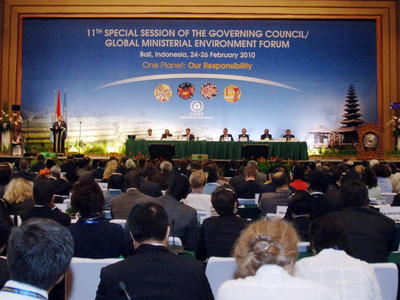Indonesia’s government has stood by its emissions target announced at a 2009 G20 summit. Just last week the President stated that he would ‘dedicate the last three years of [his] term as President to deliver enduring results that will sustain and enhance the environment and forests of Indonesia’. But, as always with such ambitious announcements, many observers are doubting how much will actually come of it.
The target is for a 26 per cent reduction relative to business-as-usual at 2020 undertaken by Indonesia unilaterally, and up to 41 per cent with international assistance. This is a substantial undertaking when taken at face value, even in comparison with other major countries. But what it actually means will depend on the definition of the business-as-usual baseline. An earlier government document submitted to the UN assumes fast growth in emissions under a business-as-usual scenario. If chosen as the official baseline, this would make the target less ambitious and affect its international credibility.
The overwhelming share of reductions over the next decade is likely to come from the land sector. This emphasis is reflected in a list of emissions reductions programs to be initiated and financed by the Indonesian government, announced last month.
But if large-scale and sustained carbon savings are to be made, this must go hand-in-hand with a more holistic approach to land-based industries. Greater emphasis would need to be placed on local environmental factors like watershed protection, local economic development that is socially inclusive, and promoting models of land use that are productive over the long run — not just profitable in the short term. ‘Green growth’ thinking along these lines is evident in some provinces, districts and central government ministries. There is even a new national motto which demands development be ‘pro-growth, pro-poor, pro-jobs and pro-environment’.
But this is set against the strong influence of industry and parts of the government and bureaucracy that have a strong vested interest in the status quo. This difficult political economy is, of course, not unique to Indonesia; it has played out in the US and Australia in recent years, with very different results. What counts on the ground though is economic opportunity and enforcement of laws and regulations. Protecting forests and peatlands, for example, will require substantial financial incentives for businesses and local governments. Reforms to the tax system, along with intergovernmental fiscal transfers tied to environmental outcomes and properly enforced regulatory measures, could achieve this — especially if they are coupled with alternative strategies to promote local economic development.
The longer-term challenge is in Indonesia’s energy system. Industrial energy use, electricity use in public buildings and homes, and transport are all growing rapidly as the country moves up the development ladder. The solution involves a shift from coal to gas, expansion of renewable energy like geothermal power, better energy efficiency and better transport systems. But making the shift requires policy reform that is difficult both technically and politically. Power sector reform has been on the agenda for decades and energy subsidies have, to date, only partially been removed. Copious amounts of additional investment will also be needed: what role can developed countries in the region play in helping Indonesia achieve its goals?
Aid can be important, and plenty of donors are (or want to become) active on climate change in Indonesia. The most promising area for aid is targeted capacity building, helping Indonesia reap the opportunities that arise in policy reform and in access to international funding. Trialling implementation options is also important, for example testing payment schemes for better land management. This carries risks, but could have large returns where successful models are identified. Large scale concessional finance, for example through the World Bank, has a role in facilitating clean energy investments. But the big game down the track could be carbon markets. A number of developed countries will be looking to invest in emissions reductions in developing countries, as part of their own climate change commitments. In most advanced countries, emissions reductions at home — beyond a certain point — will come at a higher cost than cutting emissions in developing countries. Australian annual payments for overseas emissions reductions could be as high as AU$3 billion dollars at 2020, according to government modelling. While the actual amount of market flows could be lower, this figure is in the ballpark of what Australia might commit through its Copenhagen climate financing commitment.
Large flows could also become available from Japan, South Korea, California and elsewhere. It will be natural for these and other countries to turn to Indonesia as a key ‘supplier’ of emissions reductions. But more preparatory work needs to be done in Indonesia before this can happen. Trading emissions reductions across borders requires reliable monitoring, confidence in institutional frameworks, as well as sound policies and consistent implementation. After all, investors will want confidence that they are in fact supporting change. And to the extent that Indonesia is successful in addressing climate change, it gives the country a natural leadership position on the issue in Southeast Asia.
Dr Frank Jotzo is Director at the Centre for Climate Economics and Policy, Crawford School of Economics and Government, the Australian National University.
This is an abridged version of a paper presented at the 2011 Indonesia Update Conference, the Australian National University.

